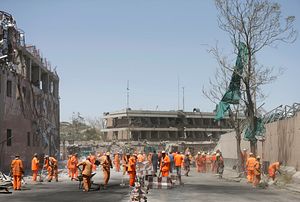On Wednesday morning, a bomb hidden in a sewage tanker exploded near the entrance to the German Embassy in Kabul. The blast, which went off during the morning commute, killed at least 85 people and injured more than 400 in central Kabul. The area of the blast is packed with embassies and the street was filled with civilians starting their day.
Afghan President Ashraf Ghani condemned the attack, saying, “Even in this holy month of Ramadan, which is a month of worship, virtue, and blessings, terrorists have no intention to stop killing the innocent people.” The office of the president’s statement on the attack called on Muslim states “to ramp up pressure on those supporting terrorist outfits so that terrorism should not be used as an instrument against other countries.”
The Taliban — the obvious suspects — quickly denied responsibility for the blast. Zabihullah Mujahid, the group’s spokesman, said in a statement, “Our countrymen must rest assured that the Kabul attack is not the work of Mujahideen.” The statement says that Taliban fighters are not allowed to carry out large explosions in ill-defined areas, and goes on to condemn all attacks on civilians.
According to the UN Assistance Mission in Afghanistan (UNAMA), in 2016 61 percent of civilian casualties were attributed to militant groups in Afghanistan, primarily the Taliban and the Afghanistan Islamic State-affiliate. In 2017, 3,498 civilians were killed and 7,920 were wounded; UNAMA attributed at least 4,953 deaths and injuries in 2016 to the Taliban, or 43 percent of the total.
Resolute Support, NATO’s training mission in Afghanistan, said in a statement that “the vigilance and courage of Afghan security forces prevented the VBIED [vehicle-borne improvised explosive device] from gaining entry to the Green Zone, but the explosion caused civilian casualties in the vicinity.”
According to Reuters, German Foreign Minister Sigmar Gabriel said that at least one Afghan security guard at the German embassy was killed and members of the diplomatic mission were injured. Photos from Kabul show the windows of the German embassy blown in. Several other embassies nearby were also damaged, including the Iranian, Indian, and Chinese embassies. The Indonesian, Emirati, Turkish, French, British, Pakistani, Canadian, and American embassies are also located near Wazir Akbar Khan road and Zanbaq square, where the blast occurred. The area is also host to schools, mosques, the Afghan Presidential Palace, and various Afghan government compounds.
It’s not clear exactly what the target was, if the aim was anything beyond death and destruction.
U.S. Embassy Kabul Special Chargé d’Affaires Ambassador Hugo Llorens condemned the attack in a statement and said America’s “commitment is unwavering; we stand with the Afghan people and the Government of National Unity…”
As of writing, U.S. President Donald Trump has not made any statement about the blast (either via the White House or Twitter), nor has the U.S. State Department issued a statement beyond Llorens’.
Last week, the heads of NATO countries met in Brussels. Secretary-General Jens Stoltenberg said that NATO could decide later this year on exact troop levels. “We will not return to a combat operation. Our aim is to train the Afghan forces to enable them to step up their efforts in stabilizing their own country,” he said. 13,000 NATO troops are currently in Afghanistan.

































